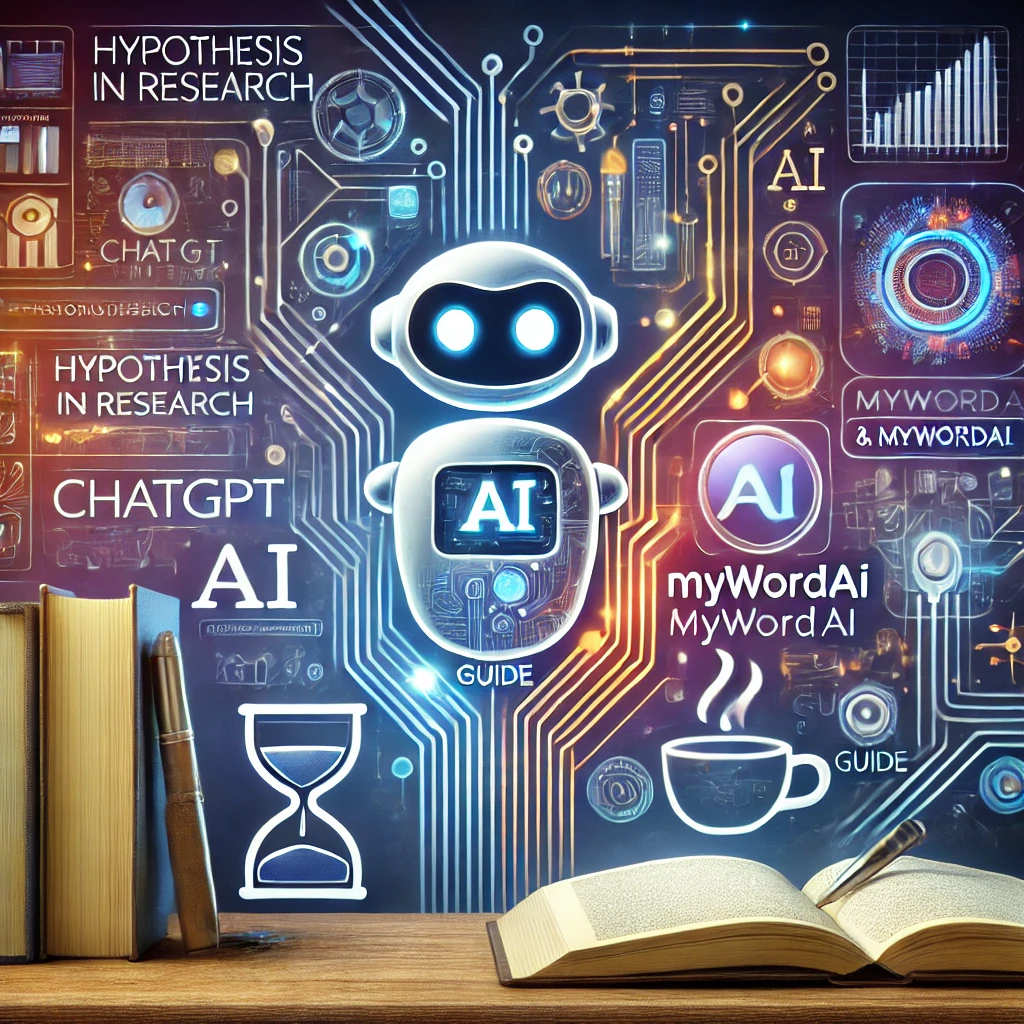Introduction:
Understanding how to write a hypothesis in research is crucial for setting the foundation of any study. A hypothesis is a prediction or assumption that a researcher intends to test through experimentation or data analysis. It provides a direction for the research and helps in framing the investigation process. In this article, we’ll explore how to develop a clear and testable hypothesis using AI-powered tools like ChatGPT and MyWordAI.com, an advanced academic writing platform. For researchers looking to simplify the process of hypothesis formulation, MyWordAI.com can be a game-changer. You can download the app from the Play Store here.

The Basics of Writing a Research Hypothesis
What is a Research Hypothesis?
A research hypothesis is a specific, testable prediction about the expected outcome of a study. It’s formulated based on existing knowledge and observations and serves as a roadmap for your research. For example, a hypothesis might state: “Students who spend more than three hours daily on social media platforms will have lower academic performance than those who do not.”
A good research hypothesis is:
- Clear and concise: It avoids vague language.
- Testable: It can be supported or refuted by experiments or data collection.
- Specific: It should focus on a single relationship between variables.
How to Write a Hypothesis: Step-by-Step Guide
Writing a hypothesis follows a structured process:
- Step 1: Identify your research question: Start by framing a research question. For instance, “Does social media usage affect academic performance?”
- Step 2: Formulate an expectation: Turn your research question into a statement that predicts an outcome.
- Step 3: Ensure it is testable: A hypothesis must be measurable through observation or experimentation.
- Step 4: State it as a prediction: For example, “Increased social media usage is negatively correlated with academic performance.”
Types of Hypotheses
There are two primary types of hypotheses that researchers use:
- Null Hypothesis (H₀): This hypothesis states that there is no significant effect or relationship between variables. For example, “There is no relationship between social media usage and academic performance.”
- Alternative Hypothesis (H₁): The alternative hypothesis suggests that there is a significant effect or relationship between variables. For example, “Increased social media usage negatively affects academic performance.”
Using AI to Write a Hypothesis
How AI Tools like ChatGPT and MyWordAI Assist in Hypothesis Development
The rise of AI has made academic writing more efficient. AI tools such as ChatGPT and MyWordAI.com can assist researchers in writing clear and precise hypotheses. MyWordAI is pre-prompted with academic templates, ensuring that even researchers unfamiliar with AI prompting can effortlessly generate accurate hypotheses.
MyWordAI.com takes it a step further by integrating AI with an automated academic writing assistant that refines hypotheses based on the research field and data input.
Hypothesis in Research: Example of Hypothesis Generated Using AI
Let’s take the research topic: “The impact of social media on academic performance.” By using MyWordAI, a hypothesis could be generated as follows:
Hypothesis Example:
“Students who spend more than four hours daily on social media will experience a decrease in their academic performance compared to those who limit their usage to less than two hours.”
This hypothesis is specific, testable, and clear, all hallmarks of a well-formulated research hypothesis.
MyWordAI.com for Hypothesis Development
How to Use MyWordAI.com for Writing a Research Hypothesis
Using MyWordAI.com for hypothesis development is a simple and straightforward process. Here’s how it works:
- Step 1: Input your research topic or question into the MyWordAI interface.
- Step 2: Select your research focus (e.g., social sciences, medical research).
- Step 3: Let the AI generate several hypothesis options for you.
- Step 4: Review the hypotheses and refine them if needed.
The integration of ChatGPT within MyWordAI ensures that researchers receive tailored outputs based on their research field, making hypothesis development faster and more efficient. You can try it out by downloading the MyWordAI app from the Play Store here.
Conclusion:
Why Use MyWordAI.com for Writing Hypotheses?
In conclusion, MyWordAI.com provides a powerful AI-powered solution for researchers to effortlessly develop research hypotheses. Its pre-promoted interface ensures that even users unfamiliar with AI can navigate through the academic writing process with ease. Whether you need to generate a research hypothesis, analyze data, or write entire research papers, MyWordAI is the go-to solution.
Ready to streamline your research process? Download MyWordAI today from the Play Store and start crafting well-defined, testable hypotheses with ease. Click here to get started!